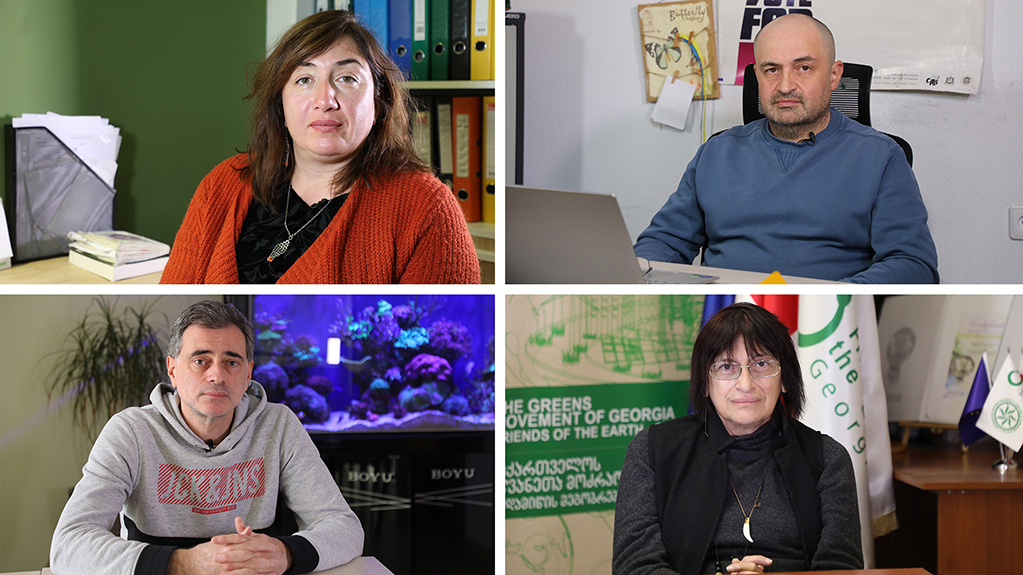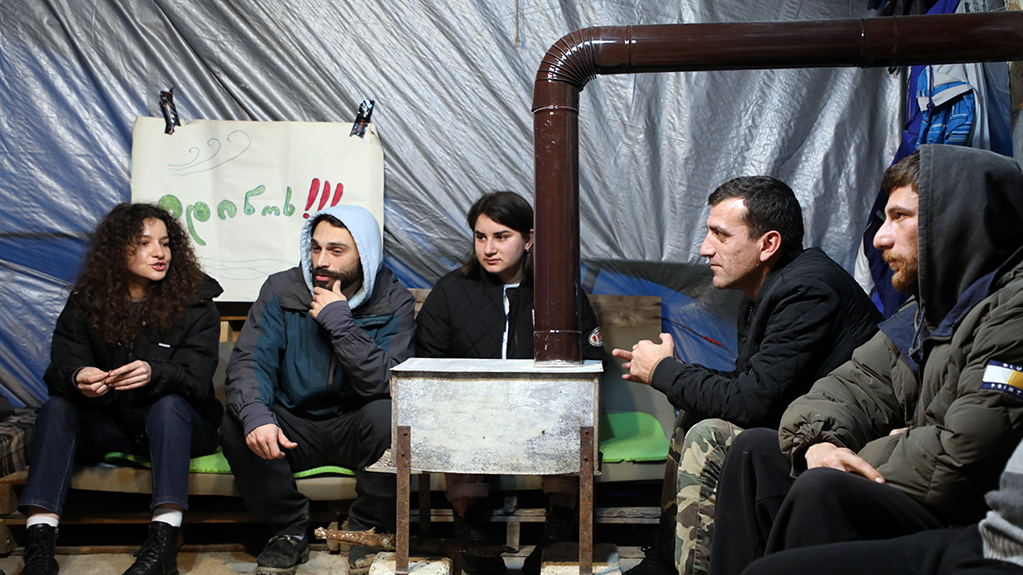One year has passed since the ongoing tent protest in Balda. The primary demand of the local residents remains unchanged: the cancellation of the decision that secretly handed over Balda Canyon to a group of former and current high-ranking officials from the Georgian Dream government for 40 years. This group, led by Valerian Mchedlidze, the former chairman of the Agency for Protected Areas, and Mamuka Merkviladze, the actual ambassador of Georgia to Russia, has been implicated in corruption. The conditions of the auction threaten to degrade the unique natural monument and prohibit locals from accessing the canyon, which is located in the heart of the village.
News
A large blue tent sits at the edge of the only motorable road leading to Balda Canyon. The residents of Balda are guarding it in shifts, day and night, to prevent the Investor Ltd from damaging the natural monument. The section of the Abasha River’s water valley, nearly 2 kilometers long, which holds the most attractive part of Balda Canyon, has been fenced off by the Investor with an iron net. Security police are stationed, and foreigners are prohibited from entering. For the Investor, who previously took control of the Prometheus Cave, Martvili and Okatse Canyons, and the Sataplia Nature Reserve for decades, the locals - Tsotne, Bacho, Tazo, Salome, Mariam, Mikho, Indiko, Nino, Mindia, and Maia - are strangers, as are the other residents of Balda, for whom the canyon is a part of their identity.
"We grew up here, we learned to swim here, we made friends here, we rested and had fun here, we celebrated our Epiphany here. We hosted guests, friends, and tourists. We were proud of Balda Canyon, and we will be proud again. Our childhood, youth, and today are all tied to this place. This canyon is part of our identity. Those who are driven by greed don't understand this," says 33-year-old Tsotne Tvaradze, one of the initiators of the Balda protest, who has faced punishment for his activism. Tsotne worked remotely as a graphic designer for the Kutaisi City Hall for about 4 years under a contract. He was fired on November 1.
Oppression to End Balda Protest
For a year, state services have been systematically oppressing the Balda Guards. Mtis Ambebi has investigated numerous cases in depth. The objective of the persecution is always the same: to stop the resistance, so that the Investor can construct concrete paths, bridges, and a nearly half-kilometer-long roller attraction on the untouched natural monument, ultimately profiting from it. The Investor has been shielded by the police, who have exerted all efforts to carry out these works. The protesters, however, have remained resolute.
- The Balda residents began their continuous tent protest on October 23 of last year, after Investor Giorgi Merkviladze (one of the company's owners and directors, and cousin of Mamuka Merkviladze) physically assaulted protester Tazo Rukhaia.
- Before this, Giorgi Merkviladze had also punched Tsotne Tvaradze inside the Martvili Natural Monuments Administration building. Subsequently, the administration’s director, Zaza Gagua, expelled the activists from the state building.
- Zaza Gagua also filed a police complaint against the Balda Canyon guards, accusing them of killing roe deer. In reality, activists had distributed a photo of a dead roe deer that had fallen into a ditch, where the Investor was concreting the canyon.
- The individuals associated with the Investor repeatedly lodged unfounded complaints against the protest participants with the police. Balda Guards were consistently summoned for questioning.
- On December 7, 2023, the Department of Environmental Supervision issued a criminal record against Nino Silagava, an active participant in the Balda protest. The department demanded a fine for Silagava and the dismantling of concrete slabs placed in the Abasha River two years earlier by local residents, which had enabled safe passage across the river. With the help of a lawyer from the non-governmental organization Civil Advocacy Center, Judge Levan Nutsubidze of the Martvili court dismissed both criminal cases. The department appealed to the Court of Appeal, but the decision was upheld.
- Supported by the government, the Investor launched an active campaign to discredit the Balda protest on social media and through government-backed media outlets.
- On June 11, 2023, Balda Canyon Guards were attacked by two residents of the same village, brothers Gela and Giga Khurtsilavas. 33-year-old Mindia Bzhalava was stabbed seven times, and his brother, Archil Bzhalava, was also injured. The brothers threatened to kill the locals, displaying a knife and a hunting rifle. Fellow villagers seized their weapons, tied them up, and handed them over to the police. Gela Khurtsilava is charged with attempted murder, while Giga Khurtsilava faces charges of threatening to kill. A few days before the attack, Gela Khurtsilava had attended a meeting organized by the Investor to support the implementation of the project in Balda Canyon. He had also been employed by the Investor for a time. The accused brothers are represented by a lawyer hired by Merkviladze.
- On June 12, Martvili police arrested Gela Khurtsilava on charges of threatening to kill his wife, leading to the removal of Balda guard Indiko Bzhalava from the protest. A journalistic investigation by Mtis Ambebi revealed that Indiko Bzhalava’s arrest was politically motivated. The testimony of the only witness in the case against him was falsified by the Martvili police investigator. After 98 days in prison, Indiko Bzhalava was released when the judge replaced his detention with a bail of 10 000 GEL. His case is still under consideration.
For more than a year, the guards of Balda Canyon have been challenging the decision to lease the natural monument in court. During this time, only one regulatory session has been held, but the substantive discussion has yet to begin.
Impact of the Balda Canyon Conflict
What impact could the Balda conflict have on the development of protected areas in Georgia?
"The impact will be very negative. When we see a bad example, many people protest against the existence of protected areas altogether. This is because such areas are not focused on the local population. They only impose restrictions and take away what is theirs." This opinion, expressed by the former Minister of Environment Protection and Natural Resources and currently the head of Green Movement - Friends of the Earth, Nino Chkhobadze, aligns with the view of Irakli Macharashvili, the director of the Society for Nature Conservation (SABUKO). "A nature monument protects biodiversity and the spiritual and cultural values related to it. These values have been neglected, and the focus has shifted to financial gain, which is inherently wrong.
This kind of development will inevitably lead to a dead end for the protected area system. Instead of increasing support for the idea of protected areas, it will create opposition."
"The main principle of nature conservation is to ensure the happiness of the local population. If the local people are not on your side, long-term conservation efforts will not succeed.
It is clear that such large-scale infrastructure, which is planned for this area, will have a serious impact on the valley.
How do you think the local population in other regions will react when we come to talk about developing protected areas? Will they look at Baldi Canyon as an example? This conflict must end," says Irakli Shavgulidze, director of the scientific-research center for species conservation Nakresi.
"As soon as we start making changes to these types of areas, they will lose their value. For example, the so-called Tsalki Canyon is very far from being suitable for ecotourism," says Natalia Bakhtadze, head of the Georgian Ecotourism Association.

Nino Chkhobadze, Irakli Macharashvili, and Natalia Bakhtadze are members of the Advisory Council of the Protected Areas Agency. As a rule, current and planned projects in protected areas should be discussed with their involvement, and decisions should be made collectively. However, the agency leased the canyons for many years without informing the council members.
"If we look at the practice, sooner or later, with any long-term lease, the government will eventually remove the laws and allow the tenant to own the private property," Nino Chkhobadze said.
"Can we transfer a protected area to private ownership? No. If someone argues that there are private protected territories, it's true in some countries, but they have a different history of creation," she emphasized, considering it unacceptable to lease protected territories, even for the purpose of attracting so-called investments.
The heads of all four environmental organizations share the same position - the decision to lease part of Balda Canyon should be revoked.















